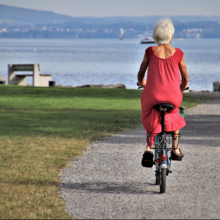Health, performance and ageing
Ageing is an individual process and can be influenced. Athletes, for example, live about 4 years longer than non-athletes. Physical activity not only increases physical fitness, but also affects vitality as well as mental health and fitness: athletes often feel physically younger, more energetic, less stressed and have more social contacts.
The Research Group Epidemiology of Performance investigates such correlations of lifestyle, fitness, and health; both across ages and for specific age groups.
Performance deficits in middle age are often attributed to ageing and sometimes seen as predestined. Our analyses of more than 500,000 endurance-trained individuals aged 20 to 80 years paint a different picture: significant reductions in performance only occur after the age of 50 years - and are small. A quarter of the 60- to 70-year-old marathon runners were even faster than half of the 20- to 50-year-olds (more).
Loss of strength, which often considerably limits the fitness and mobility of older people, can also be compensated for a long time through strength training. This is illustrated by strength measurements, balance tests and geriatric function tests which we conduct in retirement homes and leisure groups for senior citizens (more).
If you are interested in a cooperation or have any questions, please contact us:
leistungsepidemiologie@dshs-koeln.de
